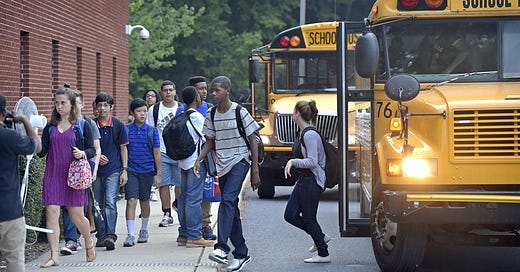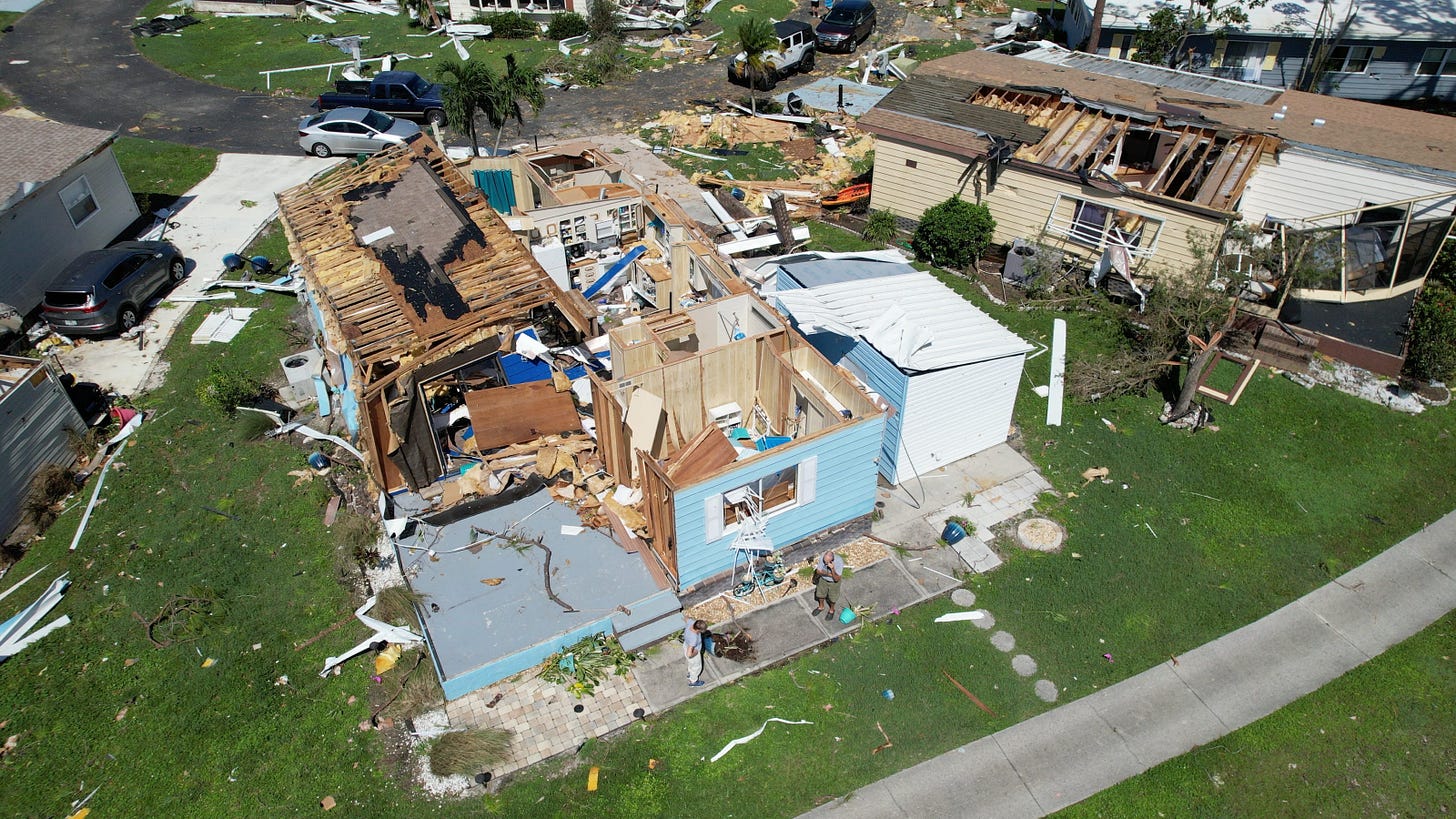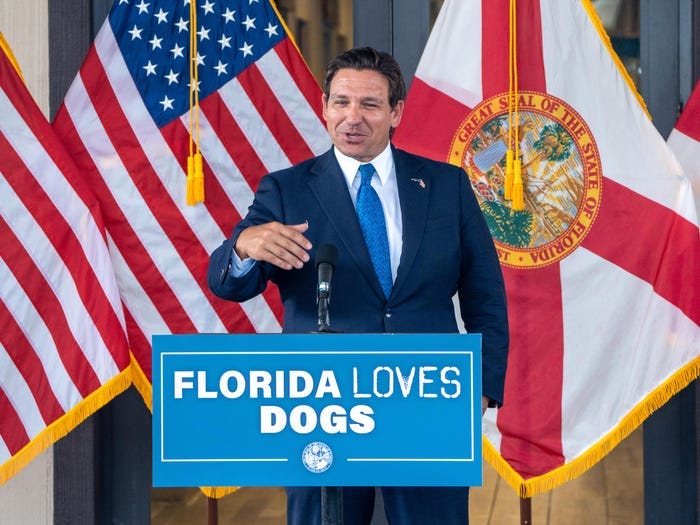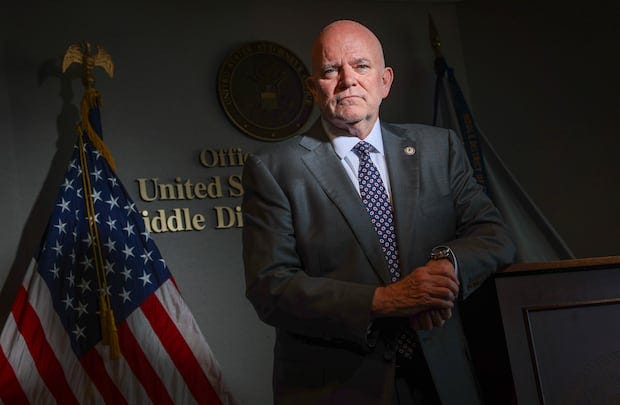Student Homelessness Surges in Central Florida & Pending Legislation Could Increase Flood Insurance Costs
May 29, 2025 - This Week's News from Central Florida
Welcome to this week’s edition of the Central Florida Times, an independent, reader-supported newsletter focusing on the Sunshine State. These are the most important stories you need to know from across Central Florida. To never miss an update, subscribe here:
Here’s the latest from Central Florida…
Student Homelessness Surges in Central Florida, Exceeding Pre-Pandemic Levels
Homelessness among students in Central Florida has reached alarming levels, with Orange, Osceola, and Seminole counties experiencing rates higher than pre-pandemic figures and more than double those seen during the pandemic years. Orange County Public Schools (OCPS) reports that 8,500 students are currently identified as homeless. In Osceola County, 3,314 children are in an unstable living situation, while Seminole County Public Schools reports 3,485 of their students to be homeless—up 32% from 2023. These children face a range of unstable living situations, from couch surfing to staying in motels, parks, emergency or transitional shelters, bus stations, campgrounds, or even vehicles. The surge in the student homeless population is attributed to persistently high rents, stagnant wages, and a severe shortage of affordable housing. The crisis is particularly acute in Winter Garden, Ocoee, Oakland, and Windermere, where 550 students lack stable housing. In Ocoee alone, 324 students are homeless, the majority in “shared housing,” a term used to describe a temporary living arrangement with friends or relatives such as "couch-surfing.” In Winter Garden, the 223 homeless students reported are also predominantly in shared arrangements. The instability of shared housing leaves many at risk of being forced onto the streets at any time. At Seminole County’s Tuskawilla Middle School, the homeless student population jumped 123% from 2023 to 2025. Furthermore, about 400 homeless students in the county are unaccompanied minors without a family. According to the McKinney-Vento Homeless Assistance Act, the federal law that ensures educational rights and support for children and youth experiencing homelessness, students are considered homeless if they "lack a fixed, regular, and adequate nighttime residence," encompassing shelters, motels, cars, and unstable shared living situations. School officials highlight the daily challenges faced by these students, from lack of internet access for homework to using public facilities or fitness clubs for basic hygiene. Concerns also persist that the official numbers may be an undercount, as some families avoid disclosure due to stigma or fear of intervention from child protective services.
Metro Orlando faces a critical shortage of affordable housing, ranking sixth among U.S. regions with the highest demand, as outlined in the National Low Income Housing Coalition's Florida GAP report. For every 100 rental households, only 19 affordable rental units are available. Orange, Osceola, and Seminole counties collectively experience a deficit of 54,273 housing units for extremely low-income households, defined as those earning 30% or less of the area's median income.
Pending Legislation Could Increase Flood Insurance Costs, Impede Efforts to Rebuild Stronger After Hurricanes
A sweeping new bill awaiting Governor Ron DeSantis’ signature could reshape how Florida communities rebuild after hurricanes, drawing sharp criticism from city officials as they warn it would freeze stricter local building codes. Senate Bill 180, which passed the Legislature with near-unanimous support, aims to streamline post-disaster recovery by expediting permits and reducing bureaucratic delays. Most notably, it includes a two-year pause on local governments adopting tougher development rules or land-use regulations until at least October 2027—potentially forcing communities to rebuild under the outdated standards that failed to protect properties during recent storms. It would allow lawsuits against municipalities for imposing codes deemed too restrictive. Critics warn the legislation would undermine local resilience efforts, preventing cities and counties from adopting tougher rules to address flooding, sea-level rise, and storm damage. The bill’s broad language, retroactive to August 2024, could halt or even reverse recent updates to local comprehensive plans and land development codes, with some leaders arguing it gives the state too much power over community planning. Furthermore, SB 180 could simplify the process for homeowners to avoid elevating structures when rebuilding after significant storm damage, a practice considered crucial for mitigating future flood risks and reducing insurance premiums. There are also long-term consequences: more than 44,000 Floridians could lose discounts on flood insurance, increasing the collective statewide cost by $1.6 million annually, according to a state study. Communities that currently benefit from flood insurance discounts by implementing robust "lookback" periods for cumulative damage could see their discounts diminish or disappear entirely. Florida homeowners already face some of the nation's highest insurance costs, with the average annual home and flood insurance policy costing $2,625 and $865, respectively. While lawmakers argue the bill prevents overregulation and allows faster rebuilding, opponents, including planners and environmental advocates, say it undermines resilience just when stronger protections are most needed. While Gov. DeSantis has not indicated whether he will sign the measure into law, its reach could reshape post-storm recovery statewide as early as this hurricane season.
DeSantis Signs ‘Trooper’s Law’ to Protect Pets During Disasters
Gov. Ron DeSantis has signed “Trooper’s Law,” a new measure imposing tougher penalties on those who abandon animals during natural disasters. The law was inspired by a widely publicized 2024 incident in which a dog—later named Trooper—was found tied to a pole near I-75 and I-4 as Hurricane Milton approached. He was rescued by a Florida Highway Patrol trooper, with the story of neglect deeply resonating across the state and nation. His former owner faced aggravated animal cruelty charges in connection with the incident. “This story is the type of cruelty we can’t tolerate in the Free State of Florida,” DeSantis said during a press conference Wednesday. Under the new law, individuals who leave animals behind in evacuation zones during declared emergencies could face up to five years in prison or a $10,000 fine. The bill, sponsored by Sen. Don Gaetz (R-Pensacola), classifies such acts as third-degree felonies. The legislation has drawn strong support from animal welfare organizations, including the Humane Society and Florida Animal Control Association. Trooper, the rescued dog, has since been adopted and now lives in Broward County.
New State Law Protects Florida’s Historic Buildings
Gov. Ron DeSantis has approved SB 582, a new law aimed at preserving Florida’s historic architecture by penalizing the unauthorized demolition of protected properties. The legislation empowers code enforcement boards and special magistrates to take action when historic buildings are unlawfully torn down. It protects the more than 1,700 structures across the state listed on the National Register of Historic Places (NRHP), which recognizes sites deemed significant to American history, culture, and architecture. Under the new statute, violators may face fines of up to 20% of the building’s pre-demolition market value, if the act was intentional and not due to a natural disaster or permitted redevelopment. Supporters say the legislation provides much-needed teeth to preservation efforts amid growing development pressure across the state, ensuring that irreplaceable landmarks are protected for future generations. The law takes effect in July.
Florida Schools Limit Free Lunch Programs Amid Funding Cuts
A growing number of Florida school districts are ending universal free lunch programs due to state and federal funding cuts and the expiration of pandemic-era relief. Districts including Broward, Duval, and Pasco have announced changes that will affect tens of thousands of students beginning in the 2025–26 school year. The shift will now require families to apply for meal assistance or pay for lunches. More than half of Florida’s public school students relied on free or reduced-price meals last year, according to the Department of Health. In Miami-Dade County, over 78,000 students qualified; in Hillsborough and Pinellas counties, more than 50% of students were eligible. Without federal stimulus funds, districts are reverting to pre-pandemic application-based meal assistance. Broward County, for example, is raising lunch prices by $1 while ending universal access, citing a $9 million annual cost. Duval will drop free lunches at 37 schools. Hillsborough County schools said it will not be raising lunch prices. A state bill proposed this year to establish a permanent universal free breakfast and lunch program failed to advance.
UF Trustees Confirm Santa Ono as President Amid DEI Opposition
The University of Florida’s Board of Trustees on Tuesday unanimously confirmed Santa Ono as the institution’s 14th president. During a two-hour public interview, the former University of Michigan leader expressed strong alignment with Governor Ron DeSantis’ vision for Florida’s higher education system, including a firm rejection of diversity, equity, and inclusion (DEI) initiatives. “DEI will not return to the University of Florida during my presidency,” Ono declared. He clarified that he shut down DEI offices at Michigan before applying for the UF role and emphasized a shift in his views. “The goal is to restore balance, protect the pursuit of truth, and create an environment where all students can thrive.” Ono also addressed antisemitism, calling it a persistent and unique threat on college campuses. Committing to institutional neutrality, he pledged not to use his role to promote personal stances on politically charged issues, including climate change. His appointment now awaits confirmation from the Florida Board of Governors.
Tariffs Begin to Pinch Florida’s Economy as Businesses Brace for Impact
Florida is already experiencing the economic ripple effects of President Trump’s newly imposed tariffs, with businesses and consumers alike feeling the strain as costs rise across key sectors. As the nation’s tenth-largest importer, with over $117 billion in imports last year, Florida relies heavily on international goods—particularly in manufacturing, construction, and agriculture. The state’s manufacturers rely heavily on foreign materials such as steel, lumber, electronics, and machinery, prompting companies to reassess supply chains. Some are reporting immediate price hikes, with raw material costs surging overnight, making it difficult for small and mid-sized firms to absorb the increases. Automobiles, aircraft/spacecraft launch vehicles, and other manufacturing and engineering materials were among Florida's top imports in 2024. Construction and real estate are also under pressure. Florida’s booming housing market, which often depends on imported wood, steel, and other materials, faces higher costs that are expected to push up home prices and slow new development. Industry leaders warn that uncertainty about future tariff rates is causing hesitation in planning and investment. Retail and hospitality businesses are preparing for rising costs on imported consumer goods, including coffee, alcohol, and everyday necessities. Small business owners who depend on international suppliers are working to absorb these increases, but many acknowledge that passing some of the costs on to customers may be unavoidable. Adding to challenges, many of the goods purchased by small businesses such as coffee beans, tea, and wood products are either not produced domestically or are available in insufficient quantities to meet current demand.
Economists caution that as companies adjust, consumers will ultimately bear much of the burden, and Florida’s tourism and export sectors could also suffer if retaliatory tariffs take hold. Last year, civilian aircraft, engines, and components, as well as telephone equipment and non-pharmaceutical medicines, were the state’s leading exports. The manufacturing and construction sectors are also growing, fueled by a business-friendly tax environment and population influx. Overall, it’s not just higher prices that concern businesses—it’s the uncertainty. Without clarity on tariff rates or long-term trade policy, Florida businesses are delaying decisions, creating what economists call “regime uncertainty” that may stunt Florida’s economic momentum. Meanwhile, the University of Florida’s Bureau of Economic and Business Research shows consumer sentiment in Florida has been trending down since the beginning of the year.
DeSantis Rejects State Funding for New Tampa Bay Rays Stadium
If the Tampa Bay Rays are to stay in Florida, the state won’t be footing the bill for a new stadium, according to Gov. DeSantis. While he supports keeping the team in Florida, the governor firmly asserted taxpayer dollars will not be used for stadium construction. However, DeSantis emphasized that any assistance from the state would be limited to infrastructure improvements, such as roads and highway exits, but not direct stadium funding. Local governments may still negotiate with the team or a future owners to develop a viable stadium plan. The Rays, currently displaced due to hurricane damage at Tropicana Field, are playing at Steinbrenner Field in Tampa and are contracted to remain in St. Petersburg through 2028. Given the series of challenges with the previously unsuccessful $1.3 billion stadium proposal, a change in team ownership might provide a viable path forward for a new venue within the Tampa Bay or Orlando markets. Both Major League Baseball and Gov. DeSantis have signaled their commitment to keeping the team in Florida, citing the state’s rapid growth and large market size.
Florida Cracks Down on Extreme Speeding
Legislation imposing tougher penalties on Florida’s most dangerous drivers has been signed by Gov. Ron DeSantis. The “super speeder” law, set to take effect July 1, targets motorists driving at least 50 mph over the speed limit or exceeding 100 mph in a reckless manner. Under the new law (HB 351), first-time violators face up to 30 days in jail and a $500 fine. Repeat offenders could see up to 90 days behind bars, a $1,000 fine, and possible license suspension for up to a year. A mandatory court appearance is also required for any violation exceeding the speed limit by more than 50 mph. The bill, sponsored by Sen. Jason Pizzo (R-Hollywood) and Reps. Danny Alvarez (R-Dover) and Susan Plasencia (R-Winter Park), passed the Senate unanimously but drew opposition in the House, where it passed 75-40. The Florida Department of Highway Safety and Motor Vehicles reports that speeding accounted for roughly 10% of all traffic fatalities in the state from 2019 to 2023. This legislation builds upon a previous law led by Senator Pizzo last year that significantly enhances law enforcement's capability to address dangerous street racing and organized vehicle takeovers, events that have resulted in fatalities and numerous arrests throughout Florida.
Greg Kehoe Takes Helm as New U.S. Attorney
Greg Kehoe, a veteran federal prosecutor and defense attorney, has taken the helm as U.S. Attorney for the Middle District of Florida, overseeing federal prosecutions across 35 counties from Jacksonville to Naples, including Tampa and Orlando. Appointed in March by U.S. Attorney General Pam Bondi, Kehoe brings decades of experience, including high-profile cases involving organized crime, white-collar fraud, and international war crimes. The 70–year-old attorney returns to the office where he once served in the early 1990s, which preceded stints prosecuting international war criminals at The Hague and helping build the case against Saddam Hussein in Iraq. Kehoe’s priorities reflect both national and local concerns. He has pledged to intensify efforts against immigration offenses and gang activity, aligning with Trump administration directives. However, he also emphasized the continued importance of prosecuting white-collar crimes, such as health care fraud, pandemic relief fraud, and corporate misconduct, citing a recent $350 million settlement with Walgreens for improper opioid dispensing as an example of the office’s impact. Kehoe plans to visit each of the district’s offices and build relationships with law enforcement and community leaders.
Tampa Sen. Jay Collins Defends Use of Hope Florida Settlement Funds for Anti-Marijuana Campaign
State Sen. Jay Collins (R-Tampa) is defending the DeSantis administration’s controversial use of settlement funds from Medicaid provider Centene, insisting the money was spent legally and in alignment with the goals of the Hope Florida program. The Tampa Republican said the $10 million contribution tied to a civil settlement agreement with the state was appropriately allocated through the Hope Florida Foundation for public awareness and substance abuse prevention. That funding ultimately supported two nonprofits—Secure Florida’s Future and Save Our Society From Drugs—with $8.5 million directed to the anti-marijuana committee Keep Florida Clean, chaired by Attorney General James Uthmeier, DeSantis’ former Chief of Staff. “These weren’t just given willy-nilly,” Collins, a vocal proponent of Hope Florida, told radio host Jenna Ellis of American Family Radio. “There’s a step process that was done to make sure the money was being appropriated and used for the right reasons.” He added that he was “so proud” of First Lady Casey DeSantis’ work with the nonprofit and characterized the scandal as politically motivated. The Hope Florida Foundation, an initiative led by Casey DeSantis, has faced scrutiny from lawmakers over whether the funds were diverted for political purposes, particularly to oppose a marijuana legalization amendment. Governor DeSantis and Attorney General James Uthmeier have maintained the transactions were legal and transparent, with DeSantis stating the foundation “acted totally appropriately.”
Sen. Rick Scott Slams House Budget Bill as Inadequate, Demands Deeper Cuts
U.S. Sen. Rick Scott (R-Florida) is voicing strong opposition to the House’s version of the proposed federal budget legislation, arguing it falls far short of what’s needed to curb spending and reduce deficits. The House’s “One Big, Beautiful Bill,” which President Donald Trump has championed, primarily extends the 2017 tax cuts, adding approximately $3.8 trillion to the deficit by 2034, according to the Congressional Budget Office (CBO) estimates. If nominally temporary policies are made permanent, this figure could swell even higher, potentially exceeding $5 trillion. Speaking to Fox Business, Florida’s senior senator called the current proposal “dead on arrival” in the Senate. Scott, a vocal fiscal hawk, insists the bill’s proposed cuts—less than 2% over ten years—are insufficient given the rapid growth in federal spending, which he says has surged by over 50% in the past five years. He advocates for a balanced budget over the next three years, targeting $6.5 trillion in spending for the 2026 cycle, a figure he claims is necessary to rein in ballooning deficits. Scott warned the national debt could approach $60 trillion within a decade if current spending trends continue, pointing to rising interest rates and inflation as consequences of fiscal mismanagement.
House Democrats Target Rep. Anna Paulina Luna As “Florida’s Most Vulnerable Republican”
House Democrats have singled out Rep. Anna Paulina Luna (R-St. Petersburg) as their top target in Florida for the 2026 election cycle. The Democratic Congressional Campaign Committee (DCCC) this week labeled the two-term congresswoman “Florida’s Most Vulnerable Republican,” citing her focus on conspiracy theories and social media controversies over constituent needs. “Anna Paulina Luna wants to be everywhere except Florida’s 13th Congressional District,” said a DCCC spokesperson. “Come next November, Florida voters will elect someone who’s focused on the issues that matter.” Though former President Donald Trump carried the district by 12 points in 2024, Luna won re-election with less than 55% of the vote, underperforming the GOP ticket. Democrats say that gap, combined with her high-profile social media activity on pop culture controversies and break with the House Freedom Caucus, signals electoral vulnerability.
Land O’ Lakes Residents Rally Against Proposed Townhome Project
A proposed 178-unit townhome development in central Pasco County is drawing strong opposition from Land O’ Lakes residents concerned about traffic congestion, flooding, and overdevelopment. Stanley Martin Homes is seeking to rezone 46 acres off 20 Mile Level Road—accessible only from westbound State Road 54—to build the Enclave at Livingston. The property, currently owned by Academy at the Lakes, sits behind Our Lady of the Rosary Catholic Church. Neighbors voiced frustration during a contentious May 12 meeting and again at a Pasco County Planning Commission hearing on May 15. Citing increased traffic congestion, already unsafe intersections, and exacerbated drainage problems due to the loss of natural areas, residents urged officials to reject the rezoning from agricultural-residential use. After two hours of discussion, project leaders requested a delay to revise plans and address concerns, pushing the decision to June 19. Meanwhile, residents criticized the school’s decision to sell the land, calling it a betrayal of previous commitments to expand educational facilities.
Magic Kingdom Unveils New Nighttime Parade ‘Disney Starlight’
Walt Disney World will launch a brand-new nighttime parade, Disney Starlight: Dream the Night Away, at Magic Kingdom on July 20, the company announced this week. The illuminated spectacle marks the park’s first regular nighttime parade since retiring the Main Street Electrical Parade in 2016. The new procession will feature glowing floats, updated costumes for Mickey Mouse and friends, and appearances by beloved characters from Disney classics and modern favorites such as “Beauty and the Beast,” “Peter Pan,” “Frozen,” “Encanto,” and “Moana.” Drawing inspiration from the legacy of past nighttime parades while introducing new technology and storytelling elements, the spectacle will include an original musical score, with subtle nods to familiar Disney Parks tunes. Specialty merchandise and themed treats will accompany the parade’s debut.
Thanks for reading this edition of the Central Florida Times. To never miss an update, subscribe for free:
In the meantime, if you learned something or found this read interesting, please consider sharing it to grow our community!










